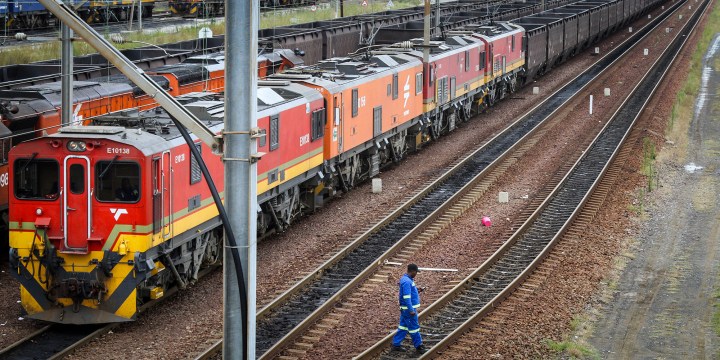TRANSFORMATION ON TRACK
Transnet reveals details of plan to rope in private sector to fix its rail network

The SOE details how it plans to embrace the private sector as a partner for delivery and fixing its rail network, but private sector players are concerned about high tariffs.
Transnet has started the process of partnering with private sector companies that are set to use the state-owned transport group’s vast rail network across South Africa to operate trains independently over the next three to five years.
If all goes according to plan, Transnet is set to open up its rail network to the private sector as early as April 2024 – a process that will unleash billions of rands from companies in upgrading the country’s transport infrastructure.
Transnet has released a draft network statement, which details how the state-owned entity (SOE) plans to embrace the private sector as a partner for delivery in its rail network that spans 21,200km across the country. The statement will be gazetted in a few days for public consultation and comments before being finalised at the start of Transnet’s next financial year, which begins on 1 April. Transnet plans to get trains operated by private sector players in the second half of the year, said the company’s new group CEO, Michelle Phillips.
Transnet’s partnership with private sector players was first mooted more than 10 years ago, but was revived in recent years by President Cyril Ramaphosa as part of a range of reforms to grow the economy. The difference now is that reforms at Transnet are urgent and the SOE needs the private sector, considering that it has a smothering debt load of R130-billion, which doesn’t give it room to fix and upgrade its rail network on its own.
Read more in Daily Maverick: Transnet unveils 100 private sector leasing opportunities at its ports
The logistics industry believes that Transnet has neglected the maintenance of its rail network over the past decade, and has estimated the maintenance backlog at R200-billion. By partnering with Transnet, private sector players will have to carry this cost, while also putting security measures in place to curb incidents of vandalism and theft of cables – which the SOE’s draft network statement revealed reached crisis levels last year – on its rail network.
The dysfunctional rail system is throwing South Africa’s economy deeper into the doldrums. Stellenbosch University’s Dr Zane Simpson estimated that Transnet’s inability to rail sufficient volumes of commodities (mainly coal and iron ore) to ports cost the economy R411-billion in 2022 and about R353-billion in 2023. This translates to about R1-billion a day in lost economic output.
How opening up rail will work
Transnet’s draft network statement takes forward the process of liberalising rail in South Africa, which has long been controlled by Transnet. The SOE sets the terms and conditions for how its customers and industry use and pay for its infrastructure to rail their goods to markets.
To liberalise rail, Transnet plans to sell rail slots on its network to third parties or private sector players, allowing them to introduce their electric locomotives, independently rail their goods to markets, and move traffic off-road and on to rail. This process will be managed by a newly established infrastructure manager office that has set general rules, deadlines, procedures and contractual arrangements for private sector players accessing Transnet’s rail infrastructure.
Read more in Daily Maverick: Transnet’s critical operation and financial situation extends from bad to worse
Some industry players see the publication of Transnet’s draft network statement as a positive move. James Holley, CEO of Traxtion, Africa’s largest private rail operator, described it as a “watershed moment and [the] government must be praised for taking another step in the right direction for rail reform in South Africa”.
“While we celebrate this progressive move, we are examining the draft statement to ensure that the conditions align with the implementation of rail reform as laid out in the National Rail Policy, adopted by Cabinet in 2022, the Freight Logistics Roadmap and the Private Sector Participation Framework, adopted by Cabinet in 2023,” said Holley.
Traxtion emerged as a successful bidder in November 2022 during Transnet’s initial process to auction rail slots in the Cape Corridor. However, Transnet cancelled the contract awarded to Traxtion, saying negotiations with the company to work out the mechanisms for its participation in the railway lines proved challenging.
The private sector largely snubbed Transnet’s initial process to auction rail slots, for several reasons.
First, Transnet required that private sector players work with a two-year period for capital investments, which involves deploying electric locomotives on the rail routes. Such an initiative requires a capital investment period of at least five to 10 years, considering that locomotives cost about $4-million to acquire and take about 24 months to bring into South Africa.
Second, Transnet set a two-year lease or contract period for using the rail slots. Private sector players wanted more than two years, considering that they would be making large investments and buying equipment that could last for at least 30 years.
Transnet has now corrected this by offering rail slots for between three and five years. Daily Maverick understands that Traxtion is keen to participate in Transnet’s new auction process.
Concerns about high charges
A point of contention among private sector players is the tariffs they will pay to Transnet and the infrastructure manager once they are allowed to run trains. Some players believe that the tariffs cited in Transnet’s draft network statement are too high.
In the long term, some private sector players believe that the government should consider cutting its operational railways in half – from 21,200km to between 10,000km and 12,000km. Holley said the reduction will allow Transnet to focus on fixing a much smaller rail network and “doing more with less”.
The Freight Logistics Roadmap supports Holley’s view, as it talks about right-sizing and closing “low-density” iron ore and coal railway lines. DM
This story first appeared in our weekly Daily Maverick 168 newspaper, which is available countrywide for R29.




















 Become an Insider
Become an Insider
Let me guess… By ‚private sector‘ we mean ‚black Industrialists‘ with prior experience in sectors such as hairdressing and funeral services. Right?
Or middle-man companies who owns zero infrastructure but just adds a 25% margin on everything.
The private sector understands business and finance. They will not throw good money at failed enterprises if there’s little hope of realising a profit.
The government must therefore not wait until they have completely destroyed a state run organisation before seeking private help.
This is a positive development but let’s be honest has only come about because Govt ain’t got no money. What is absolutely mind blowing is that someone was expecting the private sector to stump up the capital investment in two years. Whoever in Govt / Transnet dreamt up this precondition has to be living in an alternate reality and on a distant planet far, far away!
As many businesses have learned the hard way, you partner with the SA Government at your own peril…goalposts get moved, rules changed, laws amended, promises broken, invoices not paid, reputations besmirched and good intentions trampled underfoot by comrades with ideologies that belong in the 1950s.
Private busineses supply locomotives etc….but who runs the vastly overstaffed and overstretched track, maintenance, power plants etc…and the offer by Government, relatively short-term contracts!
And how did the SAA deal pan out ?
first thing cyril needs to do is deploy the SANDF to protect the country’s infrastructure – power lines, rail . . . Or, re-deploy them into new railway police and electricity police units with that same purpose
Transnet insistence on the use of electric lines that are stolen as fast as they are replaced is baffling to say the least. Self-powered traction should be the order of the day at least it does not have to rely on ever missing overhead supplies. This would also open up our local markets and provide the opportunity for local production of fuel cells to convert diesel powered traction units to fuel cell powered units cleaning up the industry in the process. Fuel cell powered traction units are already used by PGM miners so there is no need to reinvent the wheel, the wheel has lready been invented!
From the Government Gazette and Media Statements (25 March 2024)
RAIL TRANSPORT. HERE WE GO IT IS HERE.
The Department of Transport gazetted a notice calling for public comments on a draft railway network statement. According to a press release on the document:
its purpose is to provide ‘all train operating companies with … (the) unified source of information flow required for a functional rail access system’
it represents ‘a critical milestone in … rail reform … and the successful introduction of third-party access … to South Africa’s rail network’
the network statement covers ‘rules, time limits, timelines, procedures, services, charging principles, and terms and conditions governing the use of …
railway infrastructure by train operating companies’
it includes information on operational corridors making up the network, and
deals with infrastructure manager-train operating company service level agreements.
I sense this is another SAA in the making. ANC government runs the SOE into the ground, leaving a broken loss making shell with huge debts and then tries to sell it, or the use of it, to the private sector for huge sums. My advice, walk away from it, wait until the price reaches fire sale proportions.
I sense this is another SAA in the making. ANC government runs the SOE into the ground, leaving a broken loss making shell with huge debts and then tries to sell it, or the use of it, to the private sector for huge sums. My advice, walk away from it, wait until the price reaches fire sale proportions.
Maybe if the muppets listened and got decent people to run the place in the first instance we wouldn’t be in this mess requiring this now. Sad reality is we have people of below average intelligence running this country who lurch from crisis to crisis because quite plainly they are too stupid to run anything more complex than a bath with any competence whatsoever.
Not sure if the ANC even knows how a wheel works, let alone a train. I know the carbon footprint is a concern but the old puffing billies were St the heart of the industrial revolution and bringing them back would not be associated with cable theft and reliant on Eskom for electricity. Let the coal mines run their own trains. If rail doesn’t work our roads are going to collapse.
A positive step in the right direction. We need a functional railway system that’s go the right competency and experience.
The contract periods offered are a clear indication of the total lack of understanding by Transnet management of how a capital-intensive business operates. If the equipment is to be depreciated at 10% per year, then the minimum contract period should be 10 – 15 years.
From the time the contract starts, it would take some years to get the system profitable and then the return would be small and would need years to grow the profit curve after paying off the costs of bringing the system up to standard, plus accounting for depreciation of the assets.
As an investor, I would need a contract for a minimum of 20yrs and a guarantee of no interference by Transnet or Government.
Come to think of it, there are much better ways to get a better return on a comparable investment!